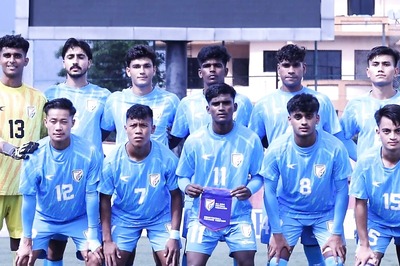
views
The latest Indian web series on Amazon Prime – Tandav – is embroiled in one controversy after another. Multiple FIRs filed for, among others, hurting religious sentiments. The accused – an actor, the Amazon India creative head and the show’s makers – approached the Supreme Court to obtain interim protection from arrest.
The SC refused to indulge them, effectively forcing them to seek remedies from courts in States where such FIRs are filed and leaving them susceptible, theoretically at least, to arrest.
Speaking purely from a legal point of view, there isn’t a wrong foot placed so far. There are actual overbroad provisions in the Indian Penal Code (IPC) – Sections 153A and 295A – which criminalize promotion of enmity between different groups as well as deliberate and malicious acts intended to outrage religious beliefs.
When a complaint is filed, the police is typically required to register an FIR. Investigation commences, and an arrest may follow, if needed, to enforce a cooperated questioning.
The SC, too, is also on sound legal footing to deny interim protections to those who approached it while it adjudicates the rest of the legal issues before it – clubbing of FIRs, for example.
Beyond the legal soundness, however, there is something erosive about this entire development.
The erosion isn’t to freedom of speech – Article 19(2) of the Constitution of India permits overbroad and vague restrictions to be placed on the exercise of that right. It isn’t about Tandav or its makers/actors either. They are going through the procedural churn, hiring the top lawyers in the country, and probably gaining an unforeseen amount of publicity.
It’s about us. It’s about our feelings, our responses and our expectations from the State.
Implicit in free speech is the right to offend (assuming that Tandav does offend) as well as the right of those offended to express themselves.
Lambast the show on the internet, dissuading others from watching it. Engage in calls for an economic boycott. In fact, ask elected politicians to voice their criticism. That same freedom of speech allows us all of this.
Should, however, the State take care of our feelings?
Psychologists, while differing on many aspects, do broadly agree on the following fundamental concept – what causes us hurt isn’t the offensive content, but our reaction to it – something we can control and are responsible for.
The SC recently stayed three crucial farm laws aimed at significantly revamping the agricultural trade sector to, in the SC’s own words, “assuage the hurt feelings of the farmers”. Asking the State to coddle us and our hurt feelings with the help of the IPC is, frankly, not dissimilar.
And, oddly, the origin of those legal provisions in the IPC date back to the time the British ruled us. Were the British touchy and sensitive? Perhaps. Ironically, however, they presided over and, as many historians assert, fueled enmity between two major religious groups – Hindus and Muslims – and no one filed a case against them under either of those two provisions!
But why, as a passionate argument goes, should one section introspect while another section of our society indulges in violence and killings when offended?
There are two major problems with this line of thought.
Firstly, what really is there a comparison about? That one section gets away with death/violence and the other won’t? What, pray, is the strength in seeking parity with the worst possible response to offence?
This isn’t to say one should turn a blind eye, which leads to the second problem. The problem is being entirely mischaracterized. Undoubtedly, what is done by those who are offended is horrific, but the end of the stick that needs significantly more examination is what is being done to deter that.
This, at its heart, becomes a law and order problem entailing police and criminal justice reforms. Any effort on that is tough, prolonged and electorally unrewarding, at least in the short term. And, may be, in this age of instant gratification, it does not satiate our need for instant justice. Or, is it that, perhaps, we, as a society, don’t want uniformly applicable law and order systems or harmonized procedures?
Let’s explore an analogy closer to home – that of a large family. Often, competing desires, insecurities and identity crises among children or adult sons/daughters are dealt with by elders in charge falling prey to the easy way out – playing favorites with some and pretend, rather effectively, to coddle the others in varying degrees. The harder way is a neutral, equal treatment, placing a greater onus of responsibility on the progeny.
What happens over time is that the structure becomes as strong as its weakest link because grounds for resentment are not only potentially limitless, but contagious across the board.
For politicians, the easy way out at a societal scale is playing favorites to a few and pretending to coddle the rest, again, in varying degrees.
This isn’t hopeless cynicism about politics. In fact, it is immensely useful to empathize with politicians. At the end of the day, they have a job – to get elected. They know the limitless resentment too well. And they know its contagious nature.
If they don’t play favorites with some of us who, in their calculation, can get them over first to the finish line, their rivals will. The cleverest among them identify what resentment they can tap into to preserve their jobs.
Today, one section is happy at how those associated with a web series are seemingly being made to run from pillar to post (they aren’t). The problem with that is that, just as politics is cyclical, the favorites are easily cyclical. Today’s favorites can be tomorrow’s discards unless the latter gather enough might to redirect favoritism to them. Pretty much what a disgruntled son shunned away in a corner office, however large and spacious, would plot to do in a family-run business.
And, as we bask in the glory of being favorites again, beneath it is a continual erosion of strength within us. Because it is, frankly, our skill at creating nuisance and the State’s choice to grant us that largesse which ultimately causes that redirection.
It’s time to give our politicians much more critical grounds to be electable. For that, it’s time to stop outsourcing our reaction to the State so that it can “assuage our hurt feelings”.
Read all the Latest News, Breaking News and Coronavirus News here

















Comments
0 comment